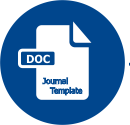Analisis Strategi Pemasaran Usaha Catering Makanan Sehat untuk Orang Tanpa Gejala (OTG)
DOI:
https://doi.org/10.12928/jfc.v4i2.4124Keywords:
Pemasaran, Makanan Sehat, Orang Tanpa GejalaAbstract
COVID-19 telah merubah tatanan kehidupan dalam waktu yang sangat singkat di dunia. Indonesia yang merupakan salah satu negara dengan menduduki peringkat serius dalam terdampak merebaknya COVID-19 membuat pemerintah mengambil kebijakan pembatasan interaksi masyarakat. Pembatasan interaksi masyarakat ini bertujuan untuk memutus rantai penyebaran COVID-19 di level terendah.
Penelitian ini bertujuan 1) mengetahui faktor lingkungan internal yang berpengaruh terhadap strategi pemasaran usaha Catering makanan sehat untuk Orang Tanpa Gejala (OTG); 2) Mengetahui faktor lingkungan eksternal yang berpengaruh terhadap strategi usaha Catering makanan sehat untuk OTG, dan 3) Mengetahui sistem pemasaran yang sesuai untuk usaha Catering makanan sehat untuk OTG. Metode yang digunakan dalam penelitian ini adalah deskriptif kualitatif dimana data diperoleh dengan cara wawancara, observasi, dan dokumentasi. Wawancara dilakukan di secara random dimana terdapat OTG pada kampung yang berada di wilayah Kota Yogyakarta..
Hasil lapangan digunakan untuk analisis SWOT yang terdiri dari tabel IFAS, tabel EFAS, matriks IE, dan matriks SWOT. Hasil penelitian ini menunjukkan faktor internal yang berpengaruh berupa Lokasi Strategis, Inovasi makanan up to date, Takaran gizi pada makanan sesuai kebutuhan, pemesanan harga produk makanan menyesuaikan kebutuhan, kurang promosi, keterbatasan armada pengiriman, Sumber Daya Manusia (SDM) dengan kemampuan terbatas. Faktor eksternal: jumlah pesaing sedikit, suplai tenaga kerja banyak, daya beli konsumen (OTG), suplai bahan pokok, respon masyarakat di sekitar baik, menu makanan mudah ditiru, faktor alergi makanan pada konsumen (OTG), harga bahan pokok yang tidak stabil.
References
Umaroh , R. dan Pangaribowo, E.H., 2020. “Welfare Impact of High-Nutrient Foods’ Price Increase on Indonesian Households: is There a Role for Own-Farm Production?â€, dalam Journal of Indonesian Economy and Business, Vol.35 No. 1.
Ayuni , R.F., 2020. “Bringing Virtual Communities into a Marketing Strategy to Create Purchase Intentions in the Social Media Eraâ€, dalam Journal of Indonesian Economy and Business, Vol.35 No. 2.
Wibowo , H.A., dan Indarti, N., 2020. “Blue-Collar Workers Entrepreneurial Intentions and The Extended Theory of Reasoned Action: Incorporating SEM and Person-Item Map Analysisâ€, dalam Journal of Indonesian Economy and Business, Vol.35 No. 3.
Ptma , T.S., dkk., 2020. “Impact of Information Quality on Customer Perceived Value, Experience Quality, and Customer Satisfaction from Using GoFood Aplicationâ€, dalam Journal of Indonesian Economy and Business, Vol.36 No. 1.
B
udiarani , V.H., dkk., 2020. “The Kano Model: How the Pandemic Influences Customer Satisfaction with Digital Wallet Services in Indonesiaâ€, dalam Journal of Indonesian Economy and Business, Vol.36 No. 1.
Bakhtiar, R.,dkk. 2020.†Relationship between understanding of COVID-19's infographics and the efforts to prevent COVID-19 transmissionâ€, dalam Journal of community empowerment for health, Vol.3 No.2.
L
eksono, T.P.,dkk. 2020.†Perceptions of a COVID-19 education public service announcement in Nunukan Regency, North Kalimantan: a qualitative studyâ€, dalam Journal of community empowerment for health, Vol.3 No.2.
Rhatomy, S.,Prasetyo., T.E., 2020.†Impact of COVID-19 on primary care visits: lesson learnt from the early pandemic periodâ€, dalam Journal of community empowerment for health, Vol.3 No.2.
Hidayati.I., dkk., 2020.†The Determinants of Inclusive Economic Growth in Yogyakartaâ€, dalam Jurnal Economia Review of Business and Economics Studies, Vol.16 No.2.
Purwanti.A.A., dkk., 2020.†Product Quality and After-Sales Service in Improving Customer Satisfaction and Loyaltyâ€, dalam Jurnal Economia Review of Business and Economics Studies, Vol.16 No.2.
Gustina.L., dkk., 2020.†The Role of Cognitive Skills, Non-Cognitive Skills, and Internet Use on Entrepreneurs’ Success in Indonesiaâ€, dalam Jurnal Economia Review of Business and Economics Studies, Vol.16 No.1.
Downloads
Published
Issue
Section
License
Copyright (c) 2022 Sudarti Sudarti, Rima Wardiana

This work is licensed under a Creative Commons Attribution-ShareAlike 4.0 International License.
Authors who publish with JOURNAL OF FOOD AND CULINARY agree to the following terms:
- All articles published are Open Access that means they will be immediately and permanently free for everyone to read and download. We use the CC-BY-SA license options under Creative Commons Attribution License (CC BY-SA 4.0). Creative Commons Attribution License (CC BY-SA 4.0). CC-BY-SA assures that all works will be available under CC-BY-SA always and no risk of commercial actions against the will of the copyright holder.
- Anyone can use, copy and disseminate the material in any medium or format; as well as re-use, re-mix, transform, and build upon the material for any purpose, even commercially. However, they must acknowledge the authors by giving appropriate credits (cite to the article or content), provide a link to the license, and indicate if changes were made and use under the same license as the original.
- Authors retain copyright and grant license exclusive rights in their article to Universitas Ahmad Dahlan as publisher of the JOURNAL OF FOOD AND CULINARY.
- Authors have the right to retain patent, trademark and other intellectual property rights (including research data).
- Authors have the right to proper attribution and credit for the published work.
Copyright Transfer Agreement
- The Authors submitting the manuscripts do so on the understanding that if they are accepted for publications, copyright of the articles shall be assigned to Universitas Ahmad Dahlan as publisher of the JOURNAL OF FOOD AND CULINARY.
- Universitas Ahmad Dahlan as publisher of The JOURNAL OF FOOD AND CULINARY, the Editors, and the Editorial Board Members of the JOURNAL OF FOOD AND CULINARY make every efforts to ensure that no wrong or misleading data, opinions or statements are published in the journal. In any way, the contents of the articles and circulars published in the JOURNAL OF FOOD AND CULINARY are the sole and exclusive responsibility of their respective authors and advertisers.
- The publisher may revoke the publication for violating the ethical code of conduct.





